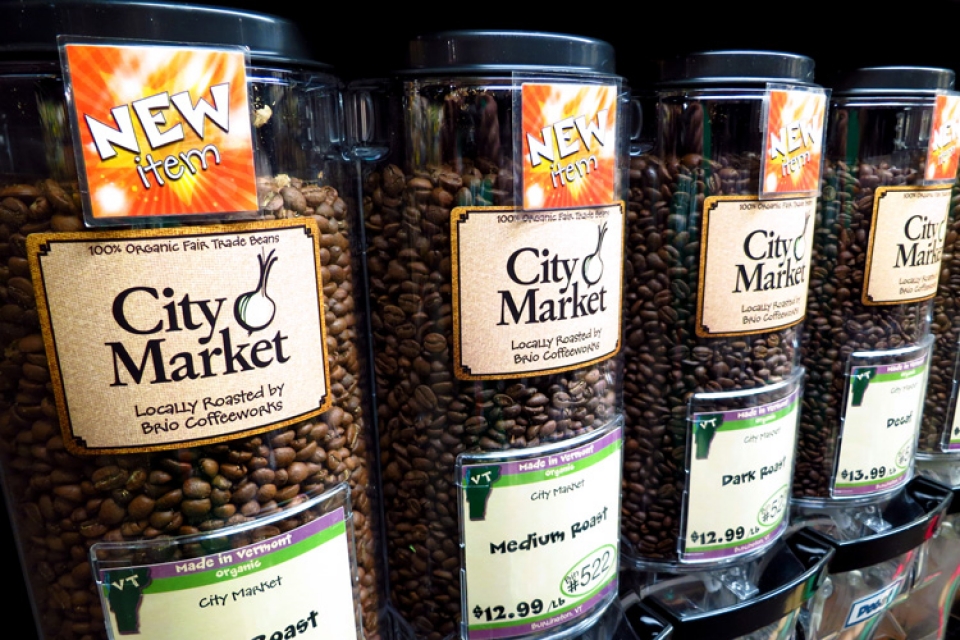Our Exclusive Fair Trade, Organic Coffee Roasts
We are extremely excited about our partnership with Burlington-based Brio Coffeeworks and the four fair trade, organic coffee roasts that we developed with them for sale in our Bulk Department! Magda and Nate from Brio stopped by recently to talk with our staff members about the new coffee roasts and about coffee in general.
Aaron Jensen (Bulk Team Lead), Alli Johnson (Store Merchandiser), Magda Van Dusen (Brio), and Nate Van Dusen (Brio)
Here is some of what we learned:
-
All of our partnership roasts are sourced from smallholder farm cooperatives that are certified organic and fair trade. Almost all the coffee is shade grown.
-
All of the coffee is 100% Arabica (no Robusta). Arabica and Robusta are the two main cultivars of coffee plants. Arabica is generally viewed to have a better flavor, whereas Robusta has more caffeine and can usually be sold more cheaply because the plants are more productive and more disease resistant.
-
One of our partnership roasts is a decaf. Our decaf is produced using a water process, as opposed to a chemical process. The water process is argued to be less environmentally harmful than the chemical process. In a water process, the green coffee beans are saturated with water that already has coffee solubles (oil and flavor molecules) in it. This water extracts the caffeine from the beans, but doesn’t decrease the oil or flavor of the beans. The water with the caffeine is then drained. This process continues until the beans are essentially caffeine free.
- Magda and Nate suggest that for the freshest coffee at home, buy your coffee beans a week supply at a time and store them in an airtight container.
The four partnership coffee roasts that we now offer in our Bulk Department are:
-
City Market Light: This coffee originates from San Juan del Rio Coco, Nicaragua and is grown at an elevation of 800-1350 meters. The coffee is purchased from the Union de Cooperativas de Servicidos Multiples (UCOSEMUN), a cooperative of seven co-ops throughout Nicaragua. UCOSEMUN has over 14,000 Members and has invested in a wet mill, a dry mill, and a warehouse that allows them to produce a higher quality product for export. The value from these investments stays in the local communities. The Co-op also offers their Members technical training in quality control and growing techniques. The Light roast is more acidic than the darker roasts and has a light body. You may notice notes of cucumber, citrus, and chocolate. This roast does the best with a pour over or drip coffee system.
-
City Market Medium: This coffee originates from La Paz, Marcala, Honduras (the first region to achieve “protected origin” denomination for coffee) and is grown at an elevation of 1295-1699 meters. The coffee is purchased from Café Organico Marcala, S.A. (COMSA), a cooperative of 62 coffee farmers in Marcala. The Co-op uses the fair trade premiums they receive to fund social projects, such as paying teachers’ salaries, buying school supplies, and constructing kitchens in schools to support meals for children. Recently, the Co-op also started marketing coffee grown by women farmers under a special label to promote and support women farmers, and the Co-op has been one of the leaders in battling coffee leaf rust in their region. The Medium roast is nuttier than the Light roast and has medium acidity. It has creamy body with a floral aroma and notes of peanut and lemon. It does well with a pour over, auto drip, or French press system.
-
City Market Dark: This coffee originates from Purosa, Papua New Guinea and is grown at 1,700 meters. The coffee is purchased from the Highland Organic Agriculture Cooperative (HOAC), which has 2,600 growers. The Co-op uses the fair trade premiums they receive to assist schools and contribute to water infrastructure and road improvement projects. They recently introduced coffee pulpers to their equipment, which will further increase the quality of their coffee for export. The Dark roast is big and bold with low acidity. It has full body with notes of cedar and cocoa. This roast stands up well to lots of cream and sugar, if that’s how you like it!
- City Market Decaf: This coffee originates from Chiapas, Mexico and is grown at an elevation of 1,200 meters. The coffee is purchased from Productores de Café de Motozintla (PROCAFEM), which has 338 Members. The Co-op works with its Members to improve coffee production and more productive subsistence farming. They also support the preservation of the Maya Quiché culture, the heritage of many of their Members. Some of PROCAFEM’s green coffee is shipped to Descamex, the first decaffeination facility in Latin America, which employs a water decaffeination process. The Decaf roast is definitely one of the best decaf coffees we have ever tried (even Magda and Nate from Brio, avid coffee drinkers, enjoy drinking the decaf!), and it has medium body, light acidity, and a nice caramel flavor.
We love working with Brio Coffeeworks, and we’re so excited to have these four partnership roasts now available exclusively to our customers. Brio Coffeeworks is located nearby on Pine Street and is open to visitors, if you are interested in learning more about how they locally-roast their coffee beans, or join us in January for a tour and class with Brio Coffeeworks. For more information about Brio Coffeeworks, please visit their website. And be sure to stop by during one of their demos to try their coffee!
